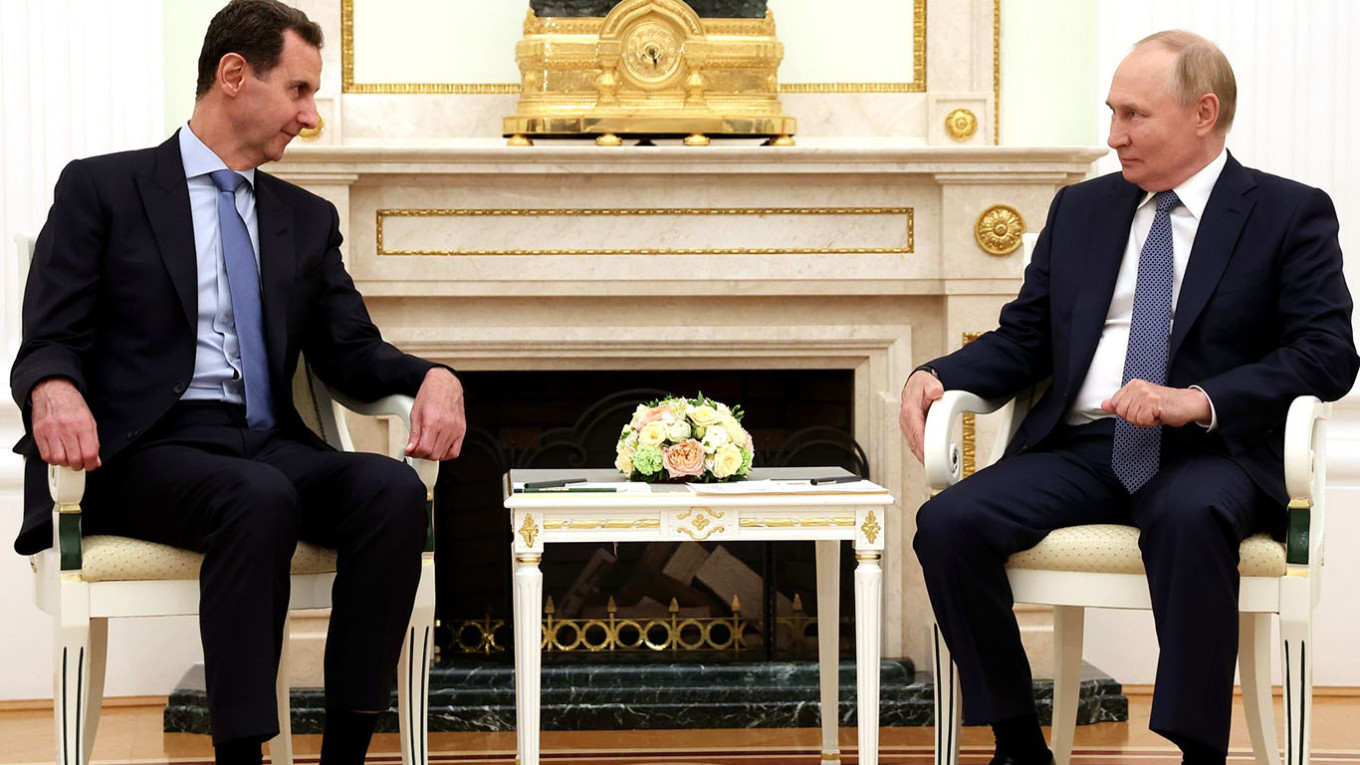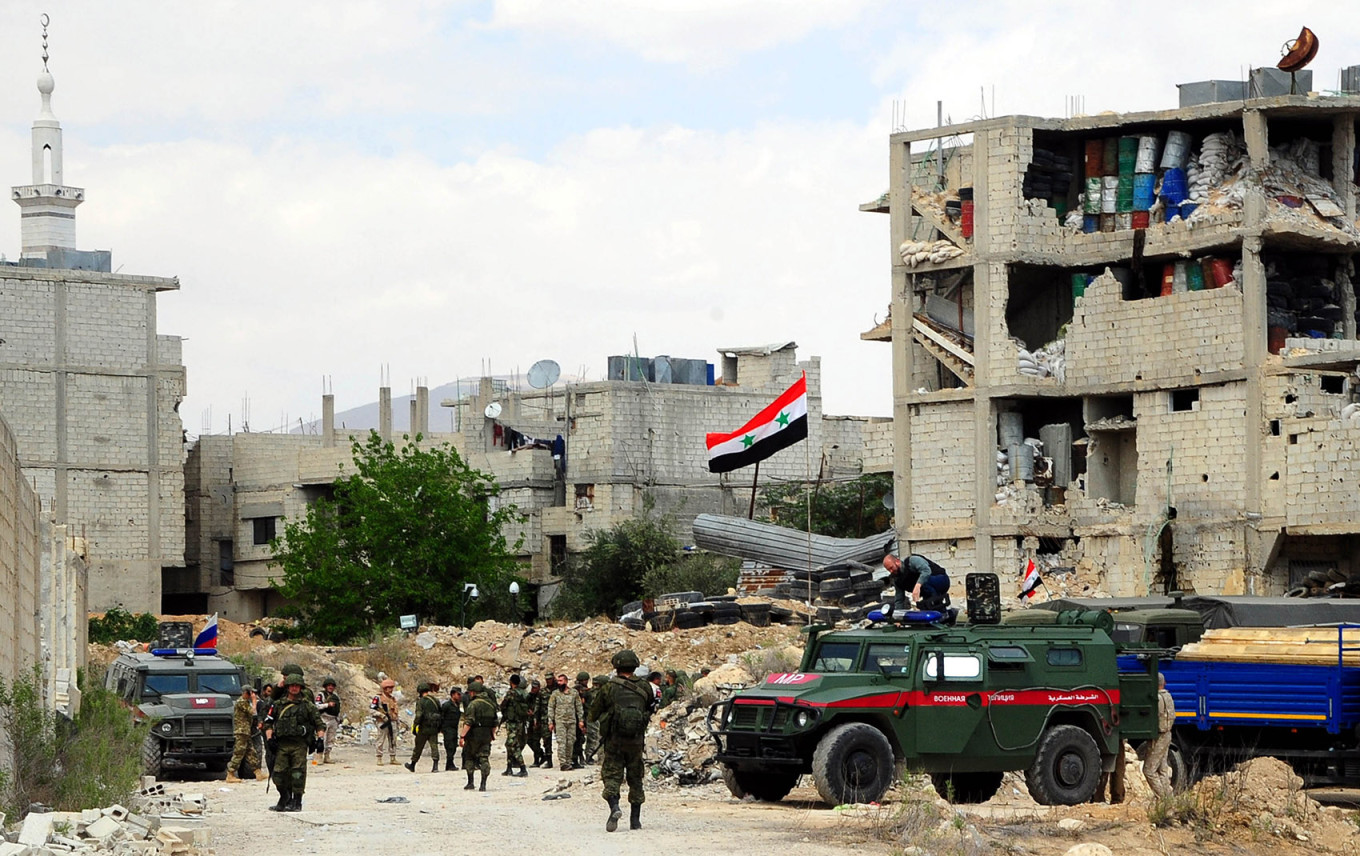Russia’s leadership is betting that chaos and infighting among the Islamist rebels who overthrew Syria’s regime will allow Moscow to hang onto its strategically important foothold in the country, Russian officials told The Moscow Times.
The swift collapse of Bashar al-Assad’s regime and his escape to Russia poses an unprecedented challenge for the Kremlin, which is already mired in its three-year invasion of Ukraine.
This foreign policy embarrassment could expand into a domestic political issue if Russian military personnel stationed in Syria are harmed.
While Russian diplomats agree that Moscow is unlikely to hold onto its Syrian military bases with Assad gone, one diplomat believes that potential internal conflicts within the victorious Syrian opposition could play in the Kremlin’s favor.
‘In half a day’
In May 2016, after Russian forces intervened in the bloody Syrian Civil War to help Assad regain control over the country, Russia staged a triumphant ceremony in Palmyra to celebrate the ancient city’s recapture from Islamic State terrorists.
“It was possible to bomb those [radical jihadists from ISIS] heading for Palmyra in half a day and save it,” Mikhail Piotrovsky, director of Russia’s State Hermitage Museum, said amid the ancient Syrian city’s ruins.
“But that did not happen. Because our [Russian troops] were not there,” he lamented.
Meanwhile, the Russian symphony orchestra — led by Kremlin-linked conductor Valery Gergiev and cellist Sergei Roldugin — performed a propaganda concert as the Russian Air Force and Navy settled in to Russia’s bases in Khmeimim and Tartus.
Anton Novoderezhkin / TASS
Two years earlier, when Damascus and Moscow were first entering discussions on potential support, former Russian prime minister and FSB director Sergei Stepashin arrived in Syria for talks.
“Tell Vladimir Vladimirovich Putin that I am not [ousted pro-Russian Ukrainian President Viktor] Yanukovych,” Assad reportedly boasted at the meeting.
‘Crumbled like a house of cards’
A decade after Assad’s statement, Palmyra, Damascus and other major Syrian cities would fall to Islamist opposition forces with almost no resistance, stunning his regime and its main backers in Moscow and Tehran.
While Russian military special forces were helping to evacuate Assad to Russia, much like they did with Yanukovych 10 years before, Russian intelligence and diplomats were already trying to find ways out of this military and political debacle that threatens Russia’s interests in the Middle East and Africa.
“Even before Assad’s escape, it was clear that the situation was critical,” a Russian official and ex-diplomat told The Moscow Times on condition of anonymity due to the sensitivity of the issue. “It’s a major inconvenience. Our diplomats and intelligence services were ordered to adapt quickly, try to engage in dialogue and start building relations with the new authorities.”

kremlin.ru
The Kremlin’s failure to defend Assad has dealt a severe blow to its reputation, Alexander Gabuev, director of the Carnegie Russia Eurasia Center, told The Moscow Times.
“The demonstration that Russia does not abandon its own, unlike [U.S. President Barack] Obama — that Putin can draw red lines and is ready to speak from a position of strength, intervening in relatively distant regions and achieving his goals with toughness — all of this has crumbled like a house of cards,” Gabuev said.
The opportunities afforded to Moscow in exchange for its backing of the Assad regime were “a very important trump card, which we now lack,” a source close to the Russian Foreign Ministry told The Moscow Times.
The source insisted however that Assad’s downfall was “primarily a defeat for Iran, since Tehran invested more in Syria and lost more there.”
Two Russian diplomats admitted to The Moscow Times that a complete Russian withdrawal from Syria, including the Tartus naval base and the Khmeimim Air Base, is likely.
“This will impact Russian logistics for supplying the Africa Corps and all these regional presence ambitions. Everything might break down. An alternative can be found, for example, Algeria, but in any case, everything will become much more complicated,” Gabuev said.
By losing its bases in Syria, Russia will lose influence in both the Middle East and the West, said Boris Bondarev, a former diplomat of the Russian mission to the UN who resigned in protest of the full-scale invasion of Ukraine.
“Since 2014, Putin has used [Syria] as a platform to make Saudi Arabia, Qatar, Iran, Egypt and Israel, and naturally, Western European countries and the U.S., reckon with him,” Bondarev told The Moscow Times.
Two current Russian government officials who previously served in the military and diplomatic corps downplayed the severity of the situation.

Ammar Safarjalani / Zuma / TASS
“Assad and Syria have become a suitcase without a handle for us. Where are we supposed to fly from Khmeimim? Is it really critical for us to possess the base in Tartus?” said a Russian government official.
“Funds for Syria will now be redirected to our operation in Ukraine. Additional squadrons of Russian aviation will now be redeployed to work on Ukrainian targets with peace of mind,” said another Russian official.
No longer ‘terrorists’
But Moscow may face even more serious troubles that could threaten the Kremlin’s international reputation and create domestic political problems — protecting the Russian military contingent in Syria.
“If something happens to them, it will be another serious blow for Putin, but for the domestic audience. The risks are high, so this is now one of the priority tasks,” said a Russian government official.
Russia informed all major regional players — Syria’s opposition, Ankara, Israel, Washington and London — via diplomatic and military channels that it “will use significant military effort, including aviation and missiles, if anything happens to its military personnel in Tartus and Khmeimim,” a Russian diplomat told The Moscow Times.
On Sunday, as anti-Assad forces captured the territories where Tartus and Khmeimim are located, Russia’s Foreign Ministry said that it was in contact with the insurgents and had received security guarantees.
The rhetoric from Russian diplomats and state television has also shifted, with the insurgents no longer referred to as “terrorists.”
‘Future chaos’
In Moscow, there is still hope that despite its failure, which partially stems from investing most of its diplomatic efforts into Assad, Russia can maintain its presence in the Middle East.
“A lot can happen in Syria,” a Russian diplomat said. “The events there may just be the beginning. There is a colorful coalition, with different factions. Some of these groups maintain close ties with Moscow. I do not rule out that we might see the country’s disintegration, or the central government’s inability to maintain control over the entire country. So there is still a field of play for Russia.”
In any case, the fall of Assad has dealt an unprecedented blow to Moscow’s political and military influence in the Middle East.
“This may be Putin’s most serious defeat in foreign policy in recent times,” Ruslan Suleymanov, a non-resident research fellow at the Azerbaijan-based Institute for Development and Diplomacy, told The Moscow Times.
A Message from The Moscow Times:
Dear readers,
We are facing unprecedented challenges. Russia’s Prosecutor General’s Office has designated The Moscow Times as an “undesirable” organization, criminalizing our work and putting our staff at risk of prosecution. This follows our earlier unjust labeling as a “foreign agent.”
These actions are direct attempts to silence independent journalism in Russia. The authorities claim our work “discredits the decisions of the Russian leadership.” We see things differently: we strive to provide accurate, unbiased reporting on Russia.
We, the journalists of The Moscow Times, refuse to be silenced. But to continue our work, we need your help.
Your support, no matter how small, makes a world of difference. If you can, please support us monthly starting from just $2. It’s quick to set up, and every contribution makes a significant impact.
By supporting The Moscow Times, you’re defending open, independent journalism in the face of repression. Thank you for standing with us.
Continue
Not ready to support today?
Remind me later.
×
Remind me next month
Thank you! Your reminder is set.

